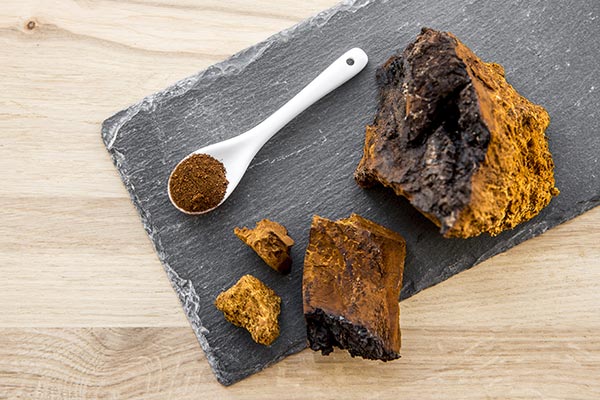
Advertisement
It’s no secret that mushrooms are some of the most potent of superfoods on the planet. Select fungi such as lion’s mane, reishi, cordyceps, turkey tail and maitake have all been linked to an impressive array of health benefits.
One other mushroom that exhibits similar potent medicinal properties is the chaga mushroom (Inonotus obliquus).
Native to the cold regions of Northern Europe, Siberia, Russia, Korea, Northern Canada and Alaska, the parasitic chaga mushroom grows mainly on the bark of birch trees, where it produces a woody growth that looks similar to a clump of burnt charcoal, albeit with a soft, bright orange-colored core.
According to experts, it was the early Russians and Siberians who first turned chaga into a medicinal tea in order to experience its purported healing abilities.
What makes the chaga mushroom so potent?
Chaga mushrooms owe their impressive healing properties to their rich antioxidant stores.
One of the most potent foods in terms of antioxidant activity, chaga mushrooms rank high on the Oxygen Radical Absorbance Capacity scale. The lumpy-looking fungi ranks 6.5 times higher than the antioxidant powerhouse that is the Acai berry.
Some of the antioxidants in chaga include the following:
- Polyphenols: Polyphenols are potent antioxidants that protect our brains and bodies from the oxidative stress and damage caused by free radicals. Chaga mushrooms produce at least six different types of these antioxidants.
- Inotodiol: A powerful sterol, inotodiol helps reduce inflammation in the body and is currently being looked at as a potential natural treatment option for cervical cancer.
- Betulin and betulinic acid: Potent triterpenoids, these two compounds are known for possessing several biological and pharmacological properties. They are especially valued for their anti-HIV, anti-inflammatory and anti-cancer potential.
- Ergosterol: Ergosterol is a sterol that’s unique to fungi. It is considered to be an important precursor of vitamin D2 and is known to inhibit some types of cancer.
- Polysaccharides: Chaga, much like other superfoods in the mushroom family, contains several polysaccharides that are said to help improve immunity and limit the spread of cancer.
- 3,4-dihydroxybenzalacetone: The most potent antioxidant in chaga, 3,4-dihydroxybenzalacetone (DBL) is a catechol-containing phenylpropanoid derivative that has been linked to several healing properties – including repairing age-related heart problems. DBL also helps prevent aging-induced fibrotic changes and myocardial apoptosis. In addition, it can control inflammation and remodeling of the heart.
What other health benefits can be traced to chaga mushrooms?
Aside from providing the body with potent antioxidants, chaga mushrooms are also linked to other health benefits, such as the following:
Chaga mushrooms can help boost the immune system and fight long-term inflammation
Chaga extract helps the body resist infections and diseases in two ways. The first is by promoting the formation of beneficial cytokines or specialized proteins that regulate the immune system. These proteins then stimulate the body’s white blood cells, thereby helping the body in its fight against infections.
The second is by inhibiting the production of harmful cytokines in the body, which are linked to long-term inflammation and ultimately, chronic diseases.
Chaga mushrooms can help prevent and fight the formation of certain cancers
Animal and test-tube studies have shown that chaga extract can help prevent and slow cancer growth.
For instance, one study found that supplementation with chaga extract resulted in a 60 percent reduction in tumor size in cancer-stricken mice. This was followed by a test-tube study, in which researchers found that chaga extract prevents the growth of cancer in human liver cells, as well as that of the lung, breast, prostate and colon.
These anticancer properties are partly due to the mushroom’s high antioxidant content, which helps protect cells from oxidative damage caused by free radicals.
Chaga mushrooms can help lower blood sugar levels
Several animal studies have linked chaga extract to reductions in blood sugar levels. This has led some researchers to conclude that the mushroom may be used to help manage diabetes.
However, as human research is still unavailable as of present, it remains unclear whether chaga can indeed help manage diabetes in humans.
Chaga mushrooms can help lower cholesterol levels
Researchers theorize that chaga extract can help the cardiovascular system by lowering one’s cholesterol levels.
Sseveral studies have shown that chaga extract effectively reduces LDL or “bad” cholesterol and triglyceride levels in mice, while at the same time, increasing their antioxidant and HDL or “good” cholesterol levels. As promising as it might be, however, more research is needed to clearly understand chaga’s cholesterol impact and if it will have similar effects on humans.
How safe is chaga, really?
Chaga is generally well-tolerated by the human body. This does not mean, however, that you can just get some chaga over the counter without telling your medical care provider.
This is mainly because chaga can interact with some common medications, most notably insulin and blood-thinning medications. As such, unsupervised use of Chaga extract can be dangerous to people who are on insulin, as well as those who have bleeding disorders or are preparing for surgery.
In addition, it is also not recommended for people with autoimmune diseases to take chaga supplements unsupervised, as it may cause the immune system to become more active.
Furthermore, no research has been conducted on the safety of chaga for women who are pregnant or breastfeeding, which is why it is recommended that they abstain from taking chaga supplements.
Packed with health-supporting compounds, chaga mushrooms possess a lot of potential as a natural supplement and as a natural alternative to over-the-counter medicine.
Sources:
Advertisements







